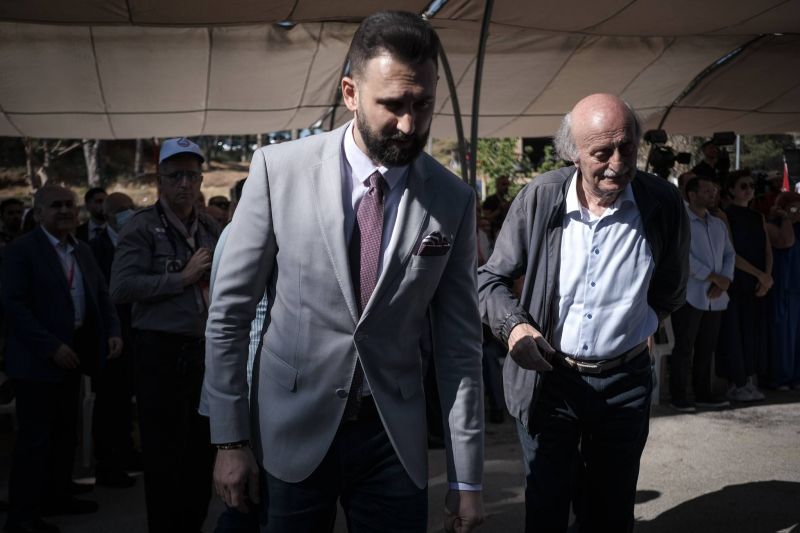
Druze leaders Teymour and Walid Joumblatt at the Grand Hotel Victoria in Ain Zhalta, Chouf, during the Progressive Socialist Party (PSP) elections on June 25, 2023. (Credit: João Sousa/L'Orient Today)
Want to get the Morning Brief by email? Click here to sign up.
Teymour Joumblatt officially succeeded his father, Walid Joumblatt, as head of the Progressive Socialist Party on Sunday. “If he wants me to help him, I'm ready,” Walid Joumblatt said, telling L’Orient Today he was “satisfied” with his 46 years in office. The elder Joumblatt’s decision to step down, though announced years ago, has been repeatedly stalled by events in the country, including “the COVID-19 pandemic, and the financial collapse,” PSP MP Bilal Abdallah told L’Orient Today in May. Walid Joumblatt became head of the PSP in 1977, following the assassination of his father Kamal Joumblatt near a Syrian army roadblock, two years after the start of the Lebanese civil war (1975-1990). In a Sunday phone call, Saudi Ambassador to Lebanon Walid al-Bukhari congratulated the younger Joumblatt on his election.
Firefighters worked for two days to extinguish a massive wildfire raging in a forest near Sinn, Akkar, in northern Lebanon. The fire started Saturday morning and spread to neighboring forests in the village of Mrahate, near Akkar al-Atiqa, and the smoke covered the woods in Doura and Qobeiyat, according to the Civil Defense. According to caretaker Environment Minister Nasser Yassin, the weekend’s blaze is “the first major wildfire this year.” The North and Akkar governorates are home to large swaths of forested areas and are particularly prone to forest fires. In April, Yassin told L’Orient Today he was concerned over the level of wildfire preparedness. According to Dr. George Mitri, director of the Land and Natural Resources Program at the University of Balamand, reports on rising global temperatures mean an “increased fire risk” in Lebanon.
On Friday, the Agriculture Ministry called on citizens to respect laws on the “protection of sharks and the preservation of their habitat” after rumors of shark-infested waters spurred poaching and sparked fears among beachgoers and resort owners. “It is crucial to comply with these regulations to guarantee responsible fishing and to preserve the balance of the marine ecosystem,” the ministry added. “The hunting and capture of sharks has fatal consequences for the ecosystem and compromises the survival of the species,” Balamand University's environmental institute director Manal Nader said. Nader warned against “unfounded fears” jeopardizing shark species present off Lebanese coasts, which are mostly “harmless.”
Employees of state electricity provider Electricité du Liban suspended their weeklong strike on Friday after reaching an agreement with the utility directors, the workers’ union said. The employees said their current insurance provider would expand their coverage awaiting its replacement, with a new company set to be chosen “within one month.” One of the chief demands voiced during the strike was the improvement of healthcare coverage. A financial support mechanism for employees is also set to be proposed on July 4. EDL employees will also benefit from discounted electricity tariffs, which were considerably increased to match the lira’s depreciation on the parallel market. Salaries increased at a much slower pace.
Also on Friday, dozens of depositors’ rights activists protested outside Banque du Liban’s headquarters in Beirut’s Hamra district against “unfair circulars” issued by the central bank. The “Depositors’ Cry” group published a statement condemning the adoption in February of the tenfold increased new official exchange pegging the lira at LL15,000 to the dollar. The statement also criticized an April central bank circular distinguishing between newly-deposited funds and deposits placed before the onset of the economic crisis in October 2019. The same group claimed credit for protests on June 15 and in February during which commercial banks were vandalized in different areas of the country. Since the onset of the crisis, commercial banks have imposed illegal restrictions on customers limiting withdrawals and transfers.
Lebanon staved off a special condemnation from an international financial crimes watchdog for its laxity in preventing money laundering and terrorism financing, Reuters reported. A Financial Action Task Force report published Friday did not include Lebanon on its “gray list,” as an earlier draft had done. Diplomatic sources told Reuters in May that Lebanon was attempting to obtain leniency in its evaluation to not be gray-listed.
In case you missed it, here’s our must-read story from over the weekend: “New series looks at life, hunt for Hezbollah’s ‘ghost’ military leader”
Compiled by Abbas Mahfouz